Prof. Malcolm Campbell Wraps a Career of Launching Pioneers of Discovery
May 31, 2024
- Author
- Mark Washburn
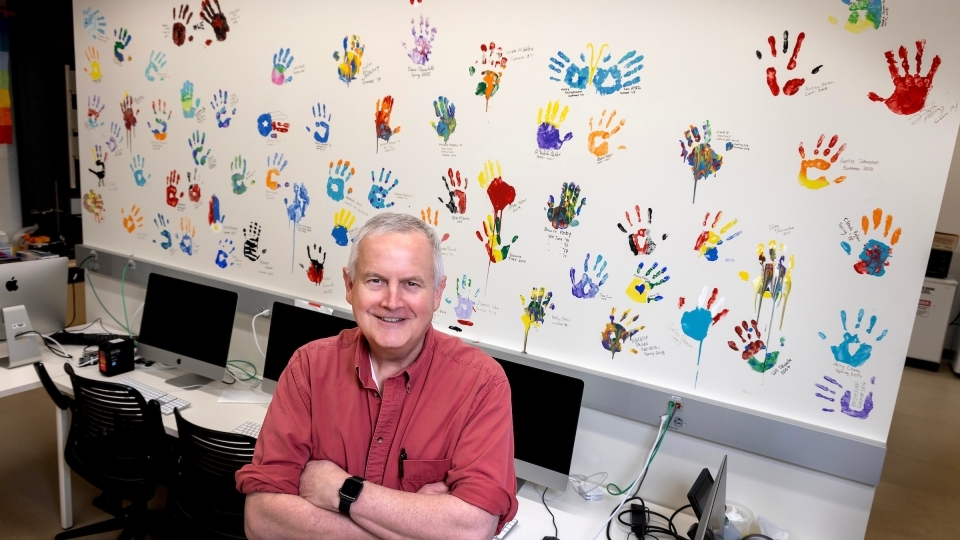
Handprints of former students decorate a wall in Prof. Malcolm Campbell’s lab, a place where students overcame self-doubt and delighted in scientific discovery for more than 30 years.
At the end of his three decades at Davidson College, a symposium in April honored Malcolm Campbell, an academic Eras Tour where colleagues and former students saluted the retiring biology professor and told tales of his impact.
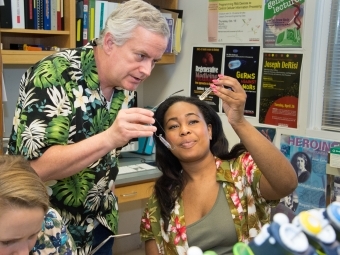
“Malcolm for me was the spark for my career,” said one former student, Sallie Permar ’97, pediatrician-in-chief at New York-Presbyterian/Weill Cornell Medical Center in New York City.
“I often wonder if I didn’t have him for a professor and mentor whether I’d have been able to achieve what I’ve achieved.”
Many of his former students at the symposium told of the tough conversations Campbell had with them, necessary, uncomfortable but compassionately executed. Others said he’d simply transformed their lives.
“I heard a lot of compliments about the match that lit the bonfire,” Campbell said. “But the spark isn’t the reason the fire gets big. No one gives you an education. You earn it.”
Permar’s remarkable career – after getting a doctoral degree in immunology from Johns Hopkins University and a medical degree from Harvard University, she has led research into prevention of infections, like HIV in newborns – was one of many that have sprung from Campbell’s laboratory.
He estimates he’s taught about 2,400 students since he arrived in 1994, many continuing on to earn advanced degrees, and 157 research advisees conducted research in his labs. He has co-authored research papers with 190 undergraduates. Some grads have started their own companies.
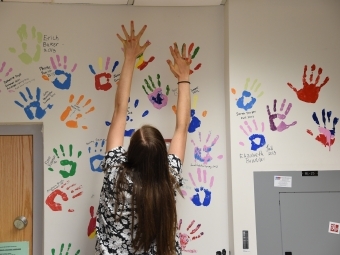
“He spent his entire career inspiring students,” Permar said. “They achieve what Malcolm thought they could achieve.”
Along the way, the Herman Brown Professor of Biology helped rewrite the rules on how best to help students learn.
With two other faculty members, Campbell has written biology textbooks that challenge the paradigm of memorization and regurgitation.
Each topic is presented as a question and offers data for students to analyze, as scientists do in the laboratory. Students reach their own conclusions, not someone else's interpretation of it. And key metrics, including scores on the Medical College Admission Test, show students learn better this way.
Julie McConnell, an Advanced Placement Biology teacher at Hough High School in Cornelius, North Carolina, and a participant in the symposium, said the book revolutionized the way she teaches.
A Seasonable Place
Campbell, now 62, grew up in Little Rock, Arkansas, and looked at three liberal arts colleges. Davidson had the best weather and got the nod. He arrived in 1980.
He received the prestigious Watson Fellowship, working on lungfish anatomy in Australia, then traveling through South East Asia for a year. It was a transformative event in his life, he said, broadening his horizons.
“I’ve been laughed at in a lot of languages around the world,” said Campbell. Which was fine. It was a lesson he learned from the Watson year: Sometimes things don’t work out. Have the courage to try things out, even if they flop.
“I don’t mind failing,” Campbell said, “as long as I give it a good try.”
After graduation and a teaching stint in Kenya, he went to Johns Hopkins University in Baltimore for his doctoral degree. He knew he wanted to teach, but Hopkins is primarily a research institution and he faced resistance.
“‘Don’t go into teaching. You’ll go brain dead,’ my advisor told me,” Campbell said.
But he stuck to his plan and while doing postdoctoral work at Macalester College in St. Paul, Minnesota, learned from biology professor Jan Serie, the most impressive teacher he’d ever seen.
If she had 120 students in the room, she knew every name, Campbell said. He studied her techniques, eventually borrowing many for his own courses.
“She would put things in the context of a question,” he said, “in a story about something they wanted to learn.”
And it was in her classes he learned what “cold calling” is: Not posing a question to the whole class, but picking out a student at random and putting them on the spot.
He said he tells his students on their first day to expect that. Sometimes there is a long silence while the student has to find the answer to something that was in the class assignment.
“Everyone gets called on,” he said. “If it's a class of 30 students, there could be 50 questions in the class. My record of silence is nine-and-a-half minutes. I timed it. Students come to class prepared because they’re going to have to answer the questions.”
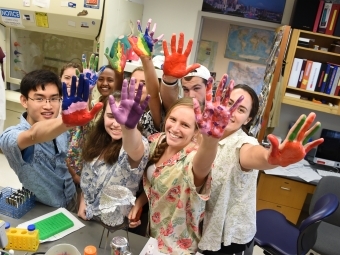
Drawn by Campbell
Laurie Heyer, the associate dean for data & computing and chair of genomics, was drawn to Davidson in part because of Malcolm Campbell. After earning her doctorate at the University of Colorado, she was looking for a teaching position that would let her use computing skills with a connection to genomics.
It was 2000 and she researched possible schools on the then-nascent Internet. She saw Campbell was doing research in the field and wrote a cover letter to Davidson suggesting that she’d be a perfect fit with his research.
They met when she came for an interview, hit it off immediately and have been research partners for 24 years. Heyer co-authored two of the biology textbooks.
At the symposium, Heyer told how Campbell got into the emerging science of genomics. A power failure in Davidson had wiped out his frozen biological samples, so he began looking for something new to do.
“If you’re Malcolm,” she said, “you look around for the next most important thing and march toward that.”
She and Campbell worked on a bold project that attracted national attention and National Science Foundation grants – using E. coli bacteria to solve complex computing problems by engineering their genetic codes. They were basically building biological computers.
“We had a ball with that research,” she said. “Of course, it got students excited.”
She said there are three rules for working with Campbell: Everybody has to learn every day, everyone must have fun and everyone tries to contribute to science.
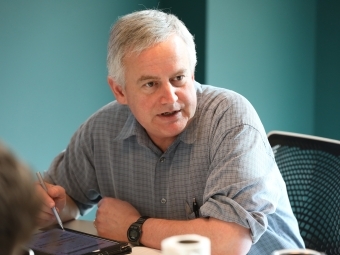
Approach to Teaching
Campbell said he treats every student the way he would treat one of his two daughters. Even if it’s a difficult conversation, it will be done with respect.
“Teaching is a joy and a privilege,” he said. “Choices for life are made here. We watch children grow into adults.”
Campbell has developed a national reputation for his work at Davidson. In 2012, the American Association for the Advancement of Science elected him a fellow in education.
He won the Excellence in Education Award from the Genetics Society of America in 2013. In 2018, it was the College Teaching Award from the National Association of Biology Teachers.
Among his Davidson-born honors are the 2023 Omicron Delta Kappa Teacher of the Year Award and the 2019 Most Valuable Professor Award, chosen by student athletes. In 2008, he received the Hunter-Hamilton Love of Teaching Award, the college’s highest teaching honor.
“Malcolm has always taken the approach when thinking about curriculum, departmental policy, research and his courses of asking what is best for the students?,” said Chris Paradise, chair of Environmental Studies, and a collaborator on the texts.
“I have attended ecology conferences, where I wouldn’t expect anyone to know Malcolm as it's not his field, and I’ve often been surprised when people say something like, ‘Oh, you’re from Davidson, you must work with Malcolm Campbell,’” Paradise said.
“So he’s nationally known in the biology education community. If you’re an ecologist, for instance, and are also involved in biology education research, you’re likely to know Malcolm.”
Paradise said that when their textbook was written, the editor wanted to change it radically to be more like a traditional introduction to biology text. Campbell stuck to their vision and they eventually wound up with another publisher.
“I’ve always respected Malcolm’s principled approach to education and life,” Paradise said.



